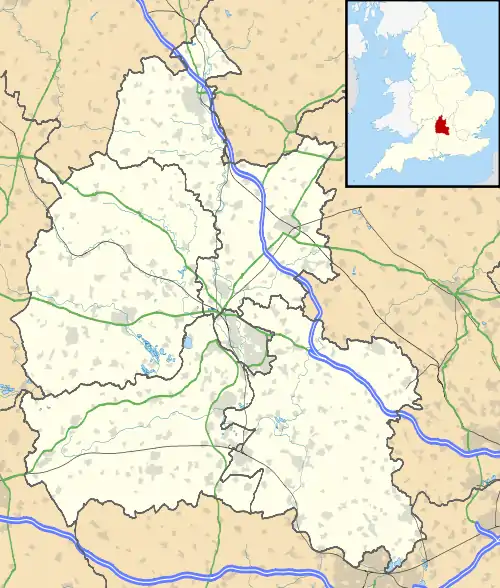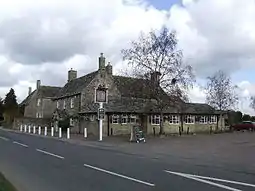| Brize Norton | |
|---|---|
 St. Britius' parish church and parish war memorial | |
 Brize Norton Location within Oxfordshire | |
| Population | 938 (2011 Census) |
| OS grid reference | SP3007 |
| Civil parish |
|
| District | |
| Shire county | |
| Region | |
| Country | England |
| Sovereign state | United Kingdom |
| Post town | Carterton |
| Postcode district | OX18 |
| Dialling code | 01993 |
| Police | Thames Valley |
| Fire | Oxfordshire |
| Ambulance | South Central |
| UK Parliament | |
| Website | Brize Norton Parish Council Website |
Brize Norton is a village and civil parish 1 mile (1.6 km) east of Carterton in West Oxfordshire. The 2011 Census recorded the parish population as 938.[1] The original part of RAF Brize Norton is in the parish.
Toponym
Around the time of the Domesday Book in 1086 the village's toponym was Norton, being the north tun (Old English for village) of Bampton.[2] In 1235, the form Suthnorton ("South Norton") was recorded, evidently to distinguish it from other Nortons further north in Oxfordshire such as Chipping Norton.[2] By the 1260s, the form Norton Brun was in use, referring to the Brun or Brown family who were the parish's manorial lords.[2] Further variants included Brunesnorton in 1297, Brimes Norton in 1303 and Brynes Norton in 1376, but the Norton Brun form outlived them and was still in use early in the 17th century.[2] The form Brysenorton had appeared by 1523, and by the middle of the 17th century it had become the usual form of the name.[2] However, Norton Brun had evolved into Norton Broyne and remained in use in church records until early in the 19th century.[2]
Church and chapel
The Church of England parish church of Saint Britius is Norman. The south doorway with its decorative tympanum, a doorway in the south wall of the chancel and the font date from this time.[3] The porch is in the Transitional style from Norman to Early English Gothic,[3] suggesting it was added slightly later. Early in the 13th century, the north aisle was added, with a four-bay Early English Gothic arcade linking it with the nave.[4] In the second half of the 13th century, the bell tower was added at the west end of the north aisle, and the present east window three lancets was inserted in the chancel.[4] A chapel forms an eastward continuation of the north aisle.[4] Two of its windows are original 13th-century lancets; two square-headed windows were added in the 14th century and the east window of the chapel is modern.[4]
The Gothic Revival architect G.E. Street restored the building in 1868.[4] The tower has a ring of six bells but they are now unusable.[5] The tenor bell was cast by Edward Neale of Burford[6] in 1679.[5] Three more were cast by Mears and Stainbank of the Whitechapel Bell Foundry[6] in 1873.[5] The two youngest bells were cast by John Warner and Sons of Cripplegate[6] in London: one in 1881 and the present treble bell in 1884.[5] St. Britius also has a service bell cast by Naylor, Vickers and Company of Sheffield[6] in 1860.[5] Brize Norton's former Primitive Methodist chapel,[7] built in 1908, is now a private house.
Economic history
In 1861, the East Gloucestershire Railway was built through the parish from Witney to Fairford. The company provided a railway station 1 mile (1.6 km) south of the village on the road to Bampton, and called it Bampton station despite it being much nearer Brize Norton than Bampton. RAF Brize Norton was established in 1937. In 1944, the Great Western Railway renamed the station Brize Norton and Bampton to reflect the increasing importance of the RAF station. British Railways closed the line and station in 1962. The site of the station is now a small industrial estate.
Amenities
Brize Norton has two public houses: The Chequers and The Masons Arms. Brize Norton has a women's Football Club[8] and a Women's Institute.[9] Brize Norton has a village recreational ground, with football and cricket ground surrounded by the Elderbank Village Hall and Sports Pavilion. The Sports Pavilion opens as Humble Bumble Cafe - a unique community facility for this DoomsDay Book listed village, as well as an 'after match' sports bar. Brize Norton has a primary school which serves children both from the village and from nearby Carterton.[10]

Transport
AW Ship Management arranged for civilians to board RAF flights to and from Brize Norton to RAF Ascension Island. The company had a package deal where passengers could travel in one direction on the RAF flights and the other on the RMS St Helena, which travelled between Saint Helena and Cape Town, South Africa until the opening of St Helena Airport to passenger flights.[11][12]
References
- ↑ "Area: Brize Norton (Parish): Key Figures for 2011 Census: Key Statistics". Neighbourhood Statistics. Office for National Statistics. Retrieved 2 November 2014.
- 1 2 3 4 5 6 Colvin et al. 2006, pp. 205–218.
- 1 2 Sherwood & Pevsner 1974, p. 487.
- 1 2 3 4 5 Sherwood & Pevsner 1974, p. 488.
- 1 2 3 4 5 Davies, Peter (12 December 2006). "Brize Norton S Britius". Dove's Guide for Church Bell Ringers. Retrieved 12 January 2011.
- 1 2 3 4 Dovemaster (25 June 2010). "Bell Founders". Dove's Guide for Church Bell Ringers. Retrieved 12 January 2011.
- ↑ Oxfordshire Churches & Chapels: Brize Norton Archived 12 November 2009 at the Wayback Machine
- ↑ Brize Norton Ladies Football Club
- ↑ Oxfordshire Federation of Women's Institutes Archived 12 November 2009 at the Wayback Machine
- ↑ "Brize Norton Primary School". Archived from the original on 17 January 2016. Retrieved 15 September 2015.
- ↑ "RMS St Helena Brochure" (PDF). AW Ship Management. p. 18. Archived from the original (PDF) on 13 January 2020. Retrieved 6 January 2020.
- ↑ "RAF Flights Fly with the RAF and meet the RMS en route". AW Ship Management. Archived from the original on 26 December 2019. Retrieved 6 January 2020.
Sources
- Colvin, Christina; Cragoe, Carol; Ortenberg, Veronica; Peberdy, R.B.; Selwyn, Nesta; Williamson, Elizabeth (2006). Townley, Simon C. (ed.). A History of the County of Oxford, Volume 15: Bampton Hundred (Part Three). Victoria County History. pp. 205–246.
- Sherwood, Jennifer; Pevsner, Nikolaus (1974). Oxfordshire. The Buildings of England. Harmondsworth: Penguin Books. pp. 487–488. ISBN 0-14-071045-0.
